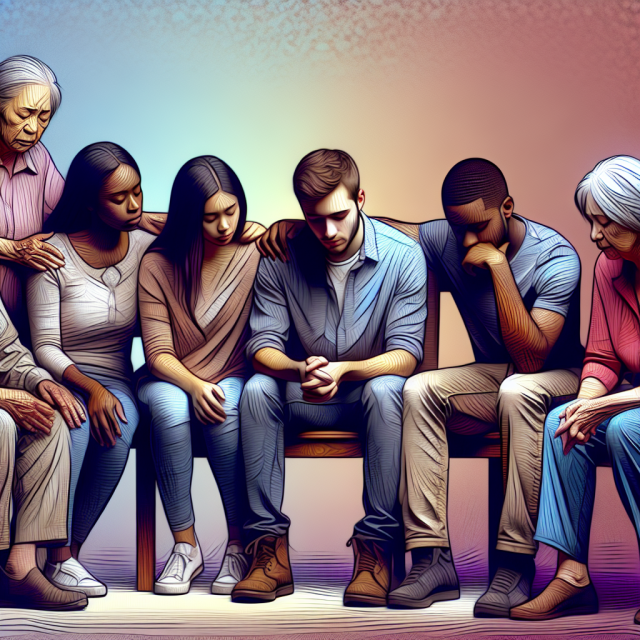
Depression can cast a long shadow over many aspects of life, including relationships. Navigating the complexities of depression while maintaining a healthy partnership can be challenging, but with understanding, effective communication, and mutual support, it is possible to foster a nurturing environment for both individuals. This article aims to provide supportive advice for those dealing with depression in their relationships, guiding readers through understanding its impact, enhancing communication, building a supportive environment, and seeking professional help.
Understanding the Impact of Depression on Relationships
Depression can significantly alter the dynamics of a relationship, often creating emotional distance and misunderstanding between partners. Those suffering from depression may experience feelings of worthlessness, hopelessness, and irritability, which can lead to withdrawal and reduced communication. This emotional withdrawal can be perceived by the non-depressed partner as a lack of interest or love, causing confusion and hurt. Recognizing that these behaviors are symptoms of depression, rather than reflections of the relationship itself, is crucial for both partners.
Moreover, depression can affect daily functioning and responsibilities, leading to increased stress on the non-depressed partner who may take on more tasks to compensate. This imbalance can create a cycle of resentment and guilt, further straining the relationship. It’s essential for both partners to acknowledge the impact of depression and approach it as a shared challenge, rather than an individual burden. By doing so, they can work together to find ways to manage and mitigate its effects on their relationship.
Communicating Effectively with a Depressed Partner
Effective communication is the cornerstone of any healthy relationship, but it becomes even more critical when one partner is dealing with depression. Open, honest conversations about feelings and experiences can help bridge the gap created by the illness. It’s important for the non-depressed partner to approach these discussions with empathy, patience, and without judgment. Simple phrases like "I’m here for you" or "I want to understand what you’re going through" can provide much-needed reassurance.
Active listening is another key component of effective communication. This means giving your full attention to your partner, acknowledging their feelings, and responding thoughtfully. Avoid offering unsolicited advice or trying to "fix" the problem, as this can often feel dismissive. Instead, focus on validating their emotions and offering your support. Creating a safe space where your partner feels heard and understood can significantly strengthen your connection and help both of you navigate the challenges of depression together.
Building a Supportive Environment for Healing Together
Creating a supportive environment is vital for the healing process when dealing with depression in a relationship. This involves establishing routines that promote mental well-being, such as regular physical activity, healthy eating, and adequate sleep. Encouraging each other to engage in these activities can help improve mood and reduce symptoms of depression. Additionally, participating in enjoyable activities together can provide a sense of normalcy and strengthen your bond.
It’s also important to set realistic expectations and boundaries. Understand that there will be good days and bad days, and that progress may be slow. Celebrate small victories and be patient with setbacks. Providing consistent emotional support and reassurance can help your partner feel more secure and less isolated. Remember, building a supportive environment is a collaborative effort that requires both partners to be understanding, flexible, and committed to each other’s well-being.
Seeking Professional Help and Self-Care Strategies
Seeking professional help is often a crucial step in managing depression. Therapists and counselors can offer valuable insights, coping strategies, and support tailored to individual needs. Couples therapy can also be beneficial, providing a space to address relationship-specific issues and learn effective communication techniques. Encourage your partner to seek help, and consider attending sessions together to show your support and commitment to their recovery.
In addition to professional help, self-care strategies are essential for both partners. The non-depressed partner should also prioritize their mental health by engaging in activities that bring joy and relaxation. This might include hobbies, exercise, or spending time with friends and family. Practicing self-care ensures that you have the emotional resilience needed to support your partner effectively. Remember, taking care of yourself is not selfish; it’s a necessary part of maintaining a healthy relationship while navigating the challenges of depression.
Navigating depression within a relationship can be challenging, but understanding its impact, maintaining open communication, building a supportive environment, and seeking professional help can make a significant difference. By approaching the situation with empathy, patience, and mutual support, couples can strengthen their bond and work towards healing together. Remember, you are not alone in this journey, and with the right strategies and support, it is possible to maintain a loving and healthy relationship despite the challenges of depression.





